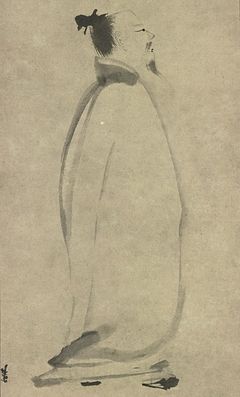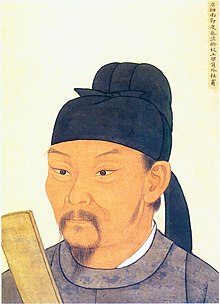Li Bai
Appearance

I drink alone, for no friend is near.
Raising my cup I beckon the bright moon,
For he, with my shadow, will make three men.

I will not spoil it by any labour or care.
Li Bai (701–762), also known as Li Po, was a Chinese poet living during the Tang Dynasty. Called the Poet Immortal, Li Bai is often regarded, along with Du Fu, as one of the two greatest poets in China's literary history.
Quotes
[edit]- 花間一壺酒,獨酌無相親。
舉杯邀明月,對影成三人。
月既不解飲,影徒隨我身。
暫伴月將影,行樂須及春。
我歌月徘徊,我舞影零亂。
醒時同交歡,醉後各分散。
永結無情遊,相期邈雲漢。- A cup of wine, under the flowering trees;
I drink alone, for no friend is near.
Raising my cup I beckon the bright moon,
For he, with my shadow, will make three men.
The moon, alas, is no drinker of wine;
Listless, my shadow creeps about at my side.
Yet with the moon as friend and the shadow as slave
I must make merry before the Spring is spent.
To the songs I sing the moon flickers her beams;
In the dance I weave my shadow tangles and breaks.
While we were sober, three shared the fun;
Now we are drunk, each goes his way.
May we long share our odd, inanimate feast,
And meet at last on the Cloudy River of the sky. - "Drinking Alone by Moonlight" (月下獨酌), one of Li Bai's best-known poems, as translated by Arthur Waley in More Translations From the Chinese (1919)
- Variant translation:
- From a pot of wine among the flowers
I drank alone. There was no one with me—
Till, raising my cup, I asked the bright moon
To bring me my shadow and make us three.
Alas, the moon was unable to drink
And my shadow tagged me vacantly;
But still for a while I had these friends
To cheer me through the end of spring...
I sang. The moon encouraged me.
I danced. My shadow tumbled after.
As long as I knew, we were boon companions.
And then I was drunk, and we lost one another.
...Shall goodwill ever be secure?
I watch the long road of the River of Stars.- "Drinking Alone with the Moon" (trans. Witter Bynner and Kiang Kang-hu)
- From a pot of wine among the flowers
- A cup of wine, under the flowering trees;

Till I think the Milky Way has tumbled from the ninth height of Heaven.
- 飛流直下三千尺,疑是銀河落九天。
- Flying waters descending straight three thousand feet,
Till I think the Milky Way has tumbled from the ninth height of Heaven. - "Viewing the Waterfall at Mount Lu" (望庐山瀑布), trans. Burton Watson
- Flying waters descending straight three thousand feet,
- 危楼高百尺,手可摘星辰。
不敢高声语,恐惊天上人。- Here it is night: I stay at the Summit Temple.
Here I can touch the stars with my hand.
I dare not speak aloud in the silence
For fear of disturbing the dwellers of Heaven. - "The Summit Temple" (夜宿山寺), in The White Pony: An Anthology of Chinese Poetry from the Earliest Times to the Present Day (1947), p. 173
- Here it is night: I stay at the Summit Temple.
- 床前明月光,疑是地上霜。
舉頭望明月,低頭思故鄉。- Before bed, the bright moon was shining.
Now, I think the ground has a frost covering.
I raise my head … to view the bright moon,
Then I lower my head … and I think of home. - "Thoughts on a Still Night" (静夜思); in Jean Ward's Li T'ai-po: Remembered (2008), p. 99
- Variant translation:
- Before my bed the moonlight glitters
Like frost upon the ground.
I look up to the mountain moon,
Look down and think of home.- "Quiet Night Thought", in Classical Chinese Literature: An Anthology of Translations (2000), p. 723
- Before my bed the moonlight glitters
- Before bed, the bright moon was shining.
- 對酒不覺暝,落花盈我衣。
- I sat drinking and did not notice the dusk,
Till falling petals filled the folds of my dress. - "Self-Abandonment" (自遣), as translated by Arthur Waley (1919)
- I sat drinking and did not notice the dusk,

Her balcony, glimmering with the bright spring dew,
Is either the tip of earth's Jade Mountain,
Or a moon-edged roof of paradise.
- 云想衣裳花想容,春风拂槛露华浓。
若非群玉山头见,会向瑶台月下逢。- Her robe is a cloud, her face a flower;
Her balcony, glimmering with the bright spring dew,
Is either the tip of earth's Jade Mountain,
Or a moon-edged roof of paradise. - "A Song Of Pure Happiness I" (清平调之一)
- Her robe is a cloud, her face a flower;
- 君不见,黄河之水天上来,奔流到海不复回。
- See how the Yellow River's waters move out of heaven,
Entering the ocean, never to return. - "Bringing In The Wine" (將進酒)
- See how the Yellow River's waters move out of heaven,
- 問余何意棲碧山,笑而不答心自閒。
桃花流水窅然去,別有天地非人間。- You ask me why do I dwell in these green mountains,
But I smile without a reply, only an easy mind.
The river flows away silently, bearing the fallen peach blossoms,
Here is another world, but not the world of men. - "Question and Answer in the Mountain"
- You ask me why do I dwell in these green mountains,
- From the walls of Baidi high in the colored dawn
To Jiangling by night-fall is three hundred miles,
Yet monkeys are still calling on both banks behind me
To my boat these ten thousand mountains away.- [33] "Through the Yangzi Gorges"

A lonely cloud floats leisurely by.
We never tire of looking at each other—
Only the mountain and I.
- All the birds have flown up and gone;
A lonely cloud floats leisurely by.
We never tire of looking at each other—
Only the mountain and I.- [38] "Alone Looking at the Mountain"
- Variant translations:
- The birds have vanished down the sky.
Now the last cloud drains away.
We sit together, the mountain and me,
until only the mountain remains.- "Zazen on Ching-t'ing Mountain", trans. Sam Hamill
- Flocks of birds fly high and vanish;
A single cloud, alone, calmly drifts on.
Never tired of looking at each other—
Only the Ching-t'ing Mountain and me.- "Sitting Alone in Ching-t'ing Mountain", trans. Irving Y. Lo
- The birds have vanished down the sky.
- 镜湖三百里,菡萏发荷花。
五月西施采,人看隘若耶。
回舟不待月,归去越王家。- On Mirror Lake outspread for miles and miles,
The lotus lilies in full blossom teem.
In fifth moon Xi Shi gathers them with smiles,
Watchers o'erwhelm the bank of Yuoye Stream.
Her boat turns back without waiting moonrise
To royal house amid amorous sighs. - Ballads Of Four Seasons: Summer (子夜四时歌 夏歌)
- On Mirror Lake outspread for miles and miles,

Such travelling is harder than scaling the blue sky.
- 蜀道之难,难于上青天!
- Oh, but it is high and very dangerous!
Such travelling is harder than scaling the blue sky. - "Hard Roads In Shu" (蜀道难)
- Oh, but it is high and very dangerous!
- 长风破浪会有时, 直挂云帆济沧海。
- I will mount a long wind some day and break the heavy waves,
And set my cloudy sail straight and bridge the deep, deep sea. - "The Hard Road" (行路難) I, trans. Witter Bynner
- I will mount a long wind some day and break the heavy waves,
- 朝辞白帝彩云间,千里江陵一日还。
两岸猿声啼不住,轻舟已过万重山。- Leaving at dawn the White Emperor crowned with cloud,
I've sailed a thousand li through Canyons in a day.
With the monkeys' adieus the riverbanks are loud,
My skiff has left ten thousand mountains far away. - "Leaving the White Emperor Town for Jiangling", as translated by Xu Yuanchong in 300 Tang Poems: A New Translation, p. 92
- Leaving at dawn the White Emperor crowned with cloud,
- 且樂生前一杯酒,何須身後千載名。
- Enjoy a cup of wine while you're alive!
Do not care if your fame will not survive! - "Hard Is the Way of the World" III, trans. Witter Bynner
- Enjoy a cup of wine while you're alive!
- 處世若大夢,胡爲勞其生?
- Since life is but a dream,
Why toil to no avail? - "A Homily on Ideals in Life, Uttered in Springtime on Rising From a Drunken Slumber" (c. 750), in A Golden Treasury of Chinese Poetry: 121 Classical Poems (1976), p. 115
- Variant translation by Arthur Waley: "Life in the World is but a big dream; I will not spoil it by any labour or care."
- Since life is but a dream,
Quotes about Li
[edit]
- Li Po's style is swift, yet never careless; lively, yet never informal. But his intellectual outlook was low and sordid. In nine poems out of ten he deals with nothing but wine or women.
- Wang Anshi, as quoted in Arthur Waley's The Poet Li Po (1919)
- The world acclaims Li Po as its master poet. I grant that his works show unparalleled talent and originality, but not one in ten contains any moral reflection or deeper meaning.
- Po Chü-i (about A.D. 816), as quoted in Arthur Waley's The Poet Li Po (1919)
- Li Bai could turn sweet nectar into verses fine.
Drunk in the capital, he'd lie in shops of wine.
Even imperial summons proudly he'd decline,
Saying immortals could not leave the drink divine.- Du Fu, "Eight Immortal Drinkers", as translated by Yuanchong Xu in Songs of the Immortals (1994), p. xxxiv
- Variant translations:
- With a jar of wine, Li makes a hundred poems,
He sleeps in an inn of Ch'angan city.
The Emperor sent for him and he'd not move,
Saying, "I'm the God of Wine, Your Majesty!"- Lin Yutang, My Country and My People (1935), p. 255
- A hundred poems per gallon of wine—that's Li Bo,
Who slept in the taverns of the market of Chang'an.
The Son of Heaven summoned him, and he couldn't stagger on the boat.
Said, "Your servant is indeed an immortal in his wine."- Stephen Owen, "Eight Drinking Immortals", in Classical Chinese Literature: An Anthology of Translations (2000), p. 721
- With a jar of wine, Li makes a hundred poems,
- "Tu's poems," she said, "are known for their workmanship and artistic refinement, while Li's poems are known for their freedom and naturalness of expression. I prefer the vivacity of Li Po to the severity of Tu Fu."
"Tu Fu is the acknowledged king of poets," said I, "and he is taken by most people as their model. Why do you prefer Li Po?"
"Of course," said she, "as for perfection of form and maturity of thought, Tu is the undisputed master, but Li Po's poems have the wayward charm of a nymph. His lines come naturally like falling flowers and flowing water, and are so much lovelier for their spontaneity. I am not saying that Tu is second to Li; only personally I feel, not that I love Tu less, but that I love Li more."- Shen Fu, Six Chapters of a Floating Life (1809), Ch. 1: 'Wedded Bliss' (trans. Lin Yutang)
- Li Po is China's prince of vagabond poets, with his drink, his dread of officialdom, his companionship with the moon, his love of high mountain scenery, and his constant aspiration: "Oh, could I but hold a celestial sword / And stab a whale across the seas!" Li Po's romanticism ended finally in his death from reaching for the shadow of the moon in the water in a drunken fit and falling overboard. Good, infinitely good, that the staid and apparently unfeeling Chinese could sometimes reach for the shadow of the moon and die such a poetic death!
- Lin Yutang, My Country and My People (1935), pp. 255–256
External links
[edit]- Li Po Poems, illustrated with Nature Photos


